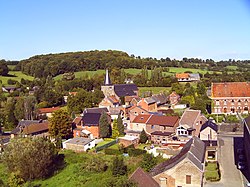Sint-Martens-Voeren
|
Voeren Fourons (French) |
|||
|---|---|---|---|
| Municipality | |||

Sint-Martens-Voeren
|
|||
|
|||
| Location in Belgium | |||
| Coordinates: 50°45′N 05°47′E / 50.750°N 5.783°ECoordinates: 50°45′N 05°47′E / 50.750°N 5.783°E | |||
| Country | Belgium | ||
| Community | Flemish Community | ||
| Region | Flemish Region | ||
| Province | Limburg | ||
| Arrondissement | Tongeren | ||
| Government | |||
| • Mayor | Huub Broers (Voerbelangen) | ||
| • Governing party/ies | Voerbelangen | ||
| Area | |||
| • Total | 50.63 km2 (19.55 sq mi) | ||
| Population (1 January 2016) | |||
| • Total | 4,099 | ||
| • Density | 81/km2 (210/sq mi) | ||
| Postal codes | 3790, 3791, 3792, 3793, 3798 | ||
| Area codes | 04 | ||
| Website | www.voeren.be | ||
Voeren (Dutch pronunciation: [ˈvuːrə(n)]; French: Fourons) is a Flemish municipality located in the Belgian province of Limburg. Bordering the Netherlands to the north and the Walloon province of Liège (Dutch: Luik) to the south, it is geographically detached from the rest of Flanders, therefore making Voeren an exclave of Flanders. Voeren's name is derived from that of a small right-bank tributary of the Meuse, the Voer, which flows through the municipality.
The current municipality of Voeren was established by the municipal reform of 1977. On 1 January 2008, Voeren had a total population of 4,207. Its total area is 50.63 km2 (19.55 sq mi), giving a population density of 83 inhabitants per square kilometre (210/sq mi). About 25% of the population is made up of foreign nationals, most of whom have Dutch nationality.
The municipality consists of the six villages of 's-Gravenvoeren (French: Fourons-le-Comte), Sint-Pieters-Voeren (French: Fourons-Saint-Pierre), Sint-Martens-Voeren (French: Fourons-Saint-Martin), Moelingen (French: Mouland), Teuven and Remersdaal (French: Rémersdael, Walloon: Rèbiévå). 's-Gravenvoeren is the most important and most populous village of the municipality.
...
Wikipedia




